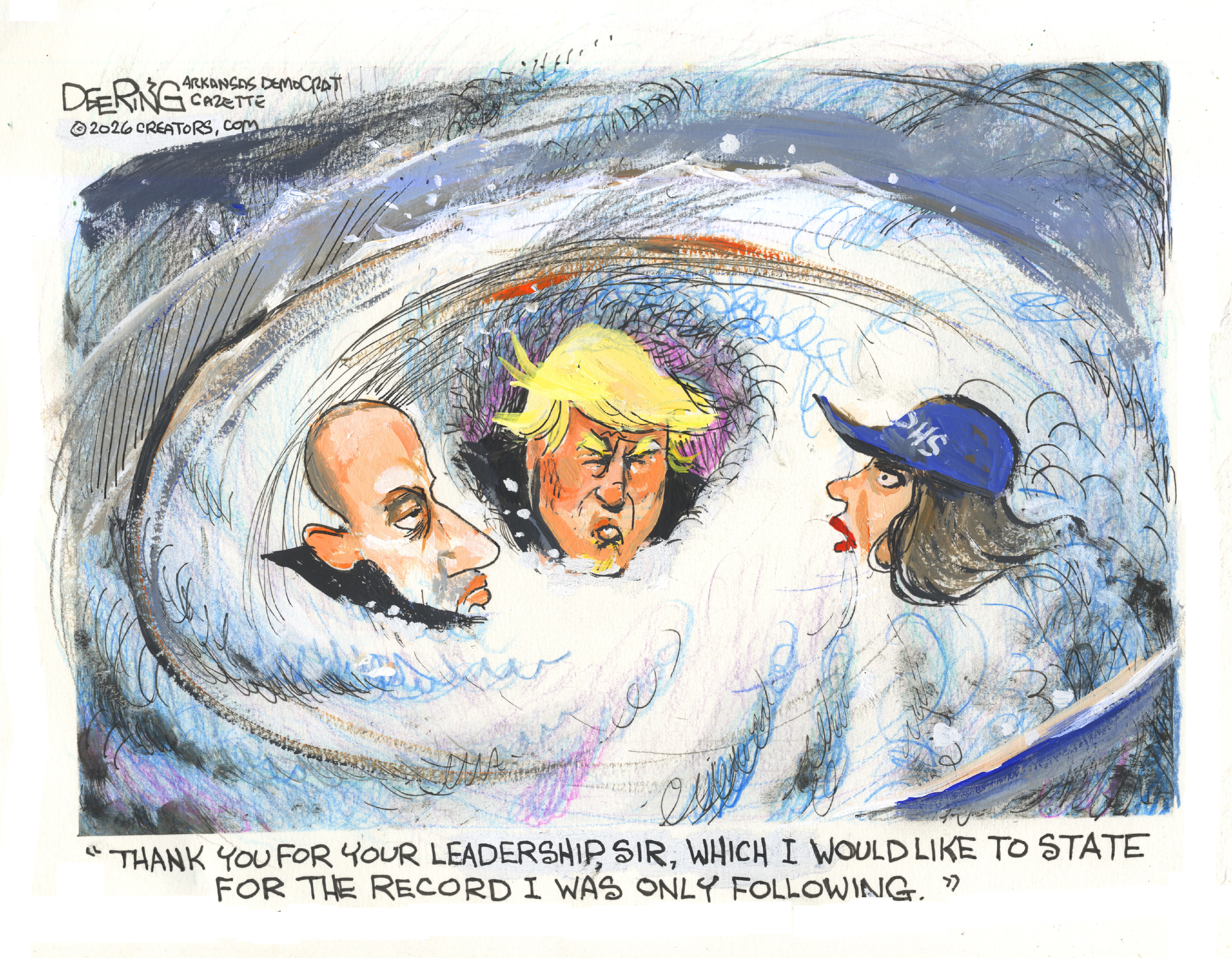There's a tsunami headed for Trump and the GOP
Why 2018 will be a wave election — and what it means for the president


A free daily email with the biggest news stories of the day – and the best features from TheWeek.com
You are now subscribed
Your newsletter sign-up was successful
Democrat Jon Ossoff came tantalizingly close to winning the "jungle primary" in Georgia's 6th district on Tuesday. Because he fell two points short of an outright majority, he'll now face Republican Karen Handel in a runoff for the seat vacated by Secretary of Health and Human Services Tom Price. Democrats want to take the almost-victory (which could still turn out to be a victory) as a sign of things to come, while Republicans want to believe that everything is going to be fine for them. Given that special elections don't necessarily prove much (and a movement of a couple of points in one direction or the other certainly doesn't), what are the chances that there will be a genuine "wave" election in 2018?
This is an important question.
If the Democrats can take back either house of Congress, the political landscape in Washington would be utterly transformed. All legislation on conservative goals would immediately cease. Armed with subpoena power, Democrats would begin vigorous and vexing investigations of the Trump administration — on Russia and who knows what else. Not only that, the new Democratic chair of the tax-writing committee in whichever house they hold would immediately order the IRS to turn over Trump's tax returns (which is within the committee's power); the ensuing lawsuit would no doubt go all the way to the Supreme Court. If Democrats were to take the Senate (less likely than the House given who's up for re-election, but still possible), you can bet they'd refuse to confirm any nominee if a Supreme Court seat opened up, in retaliation for what Republicans did to Merrick Garland. Things would get even more interesting than they are now.
The Week
Escape your echo chamber. Get the facts behind the news, plus analysis from multiple perspectives.

Sign up for The Week's Free Newsletters
From our morning news briefing to a weekly Good News Newsletter, get the best of The Week delivered directly to your inbox.
From our morning news briefing to a weekly Good News Newsletter, get the best of The Week delivered directly to your inbox.
So the stakes are incredibly high. And wave elections aren't that unusual; in fact, in recent years they've become more rule than exception in midterm elections. A wave isn't defined by a set number of seats changing hands. Instead, it generally means that the characteristics of each district and each candidate are at least partially washed away by a broad national trend. Ordinarily safe seats become suddenly contested and strong candidates can lose, if they're in the wrong party. It's what happened in 2014 when Republicans took the Senate, in 2010 when they took the House, and in 2006 when Democrats took both. In all those cases, the opposition's voters were motivated by dislike of the sitting president to turn out in large numbers, sweeping out incumbents who might have managed to win in a different year.
While we're still more than 18 months away from the 2018 election, signs are surely pointing toward something similar happening. The Democratic base is more energized than it has been in anyone's memory, filling town hall meetings, organizing "Indivisible" groups (the organization claims that 5,800 have been created), and flooding local Democratic Party chapters with volunteers. While they may have fallen short in the special elections in Republican districts in Kansas and Georgia, what's most telling is how close they came. And as Harry Enten pointed out, "According to the weighted average of the past two presidential elections, there are 48 House districts that were won by GOP candidates in 2016 that are bluer than Georgia 6 [...] And Democrats need to win just 24 Republican-held seats for control of the House."
There are also ways in which the prediction of a wave election to come can become a self-fulfilling prophecy. If you're a Republican member of Congress from a swing district, looking at President Trump's weak approval ratings and getting yelled at by your constituents over the failed attempt to repeal the Affordable Care Act, this may start to seem like a good time to retire and cash in with a sweet lobbying gig. Chairman of the House Oversight Committee Jason Chaffetz (R-Utah) just announced that he won't be running for re-election, and you'll probably be seeing many more Republican members decide that the time has come to move on.
At the same time, the most talented potential GOP candidates may choose to hold off on their congressional ambitions. If there really is going to be a wave election, running for an open seat or challenging a Democratic incumbent would seem like a fool's errand; better to wait for a more opportune moment. On the other side, Democrats are practically lining up to run not just for Congress but for offices all the way down to dog catcher.
A free daily email with the biggest news stories of the day – and the best features from TheWeek.com
And if Trump remains unpopular, Republicans could face a dispirited base of their own, not to mention that many voters in the middle would choose to express their displeasure at the president the way they so often do, by voting for the other party for lower offices.
Of course, nothing is guaranteed, not by a long shot. Trump could rack up a bunch of successes and reverse his standing in the polls. Republicans' relentless efforts to keep Democrats from voting could bear fruit. The election might be canceled after we exchange nuclear attacks with North Korea. It's all possible. But if next November things look like they do today, a wave will be on its way, and the Trump presidency will be in even more trouble than it is now.
Paul Waldman is a senior writer with The American Prospect magazine and a blogger for The Washington Post. His writing has appeared in dozens of newspapers, magazines, and web sites, and he is the author or co-author of four books on media and politics.
-
 Political cartoons for February 8
Political cartoons for February 8Cartoons Sunday’s political cartoons include going down the drain, American history, and more
-
 Touring the vineyards of southern Bolivia
Touring the vineyards of southern BoliviaThe Week Recommends Strongly reminiscent of Andalusia, these vineyards cut deep into the country’s southwest
-
 American empire: a history of US imperial expansion
American empire: a history of US imperial expansionDonald Trump’s 21st century take on the Monroe Doctrine harks back to an earlier era of US interference in Latin America
-
 The billionaires’ wealth tax: a catastrophe for California?
The billionaires’ wealth tax: a catastrophe for California?Talking Point Peter Thiel and Larry Page preparing to change state residency
-
 Bari Weiss’ ‘60 Minutes’ scandal is about more than one report
Bari Weiss’ ‘60 Minutes’ scandal is about more than one reportIN THE SPOTLIGHT By blocking an approved segment on a controversial prison holding US deportees in El Salvador, the editor-in-chief of CBS News has become the main story
-
 Has Zohran Mamdani shown the Democrats how to win again?
Has Zohran Mamdani shown the Democrats how to win again?Today’s Big Question New York City mayoral election touted as victory for left-wing populists but moderate centrist wins elsewhere present more complex path for Democratic Party
-
 Millions turn out for anti-Trump ‘No Kings’ rallies
Millions turn out for anti-Trump ‘No Kings’ ralliesSpeed Read An estimated 7 million people participated, 2 million more than at the first ‘No Kings’ protest in June
-
 Ghislaine Maxwell: angling for a Trump pardon
Ghislaine Maxwell: angling for a Trump pardonTalking Point Convicted sex trafficker's testimony could shed new light on president's links to Jeffrey Epstein
-
 The last words and final moments of 40 presidents
The last words and final moments of 40 presidentsThe Explainer Some are eloquent quotes worthy of the holders of the highest office in the nation, and others... aren't
-
 The JFK files: the truth at last?
The JFK files: the truth at last?In The Spotlight More than 64,000 previously classified documents relating the 1963 assassination of John F. Kennedy have been released by the Trump administration
-
 'Seriously, not literally': how should the world take Donald Trump?
'Seriously, not literally': how should the world take Donald Trump?Today's big question White House rhetoric and reality look likely to become increasingly blurred
